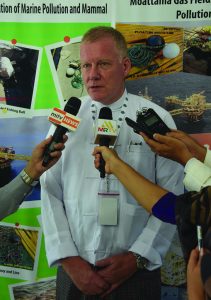The Regional Informational Workshop on Deep Seabed Resources and the Blue Economy for ASEAN and BIMSTEC countries was held at Park Royal Hotel in Nay Pyi Taw yesterday morning. The following is the excerpt from interview with Secretary General of the International Seabed Authority (ISA) Mr Michael Lodge who took part in the workshop.
Q: Could you explain the objective of this workshop?
Ans: We have a hundred and sixty-eight member countries, including Myanmar. We are pleased to be here this week. This is the first time this organization has taken a long way to Myanmar to hold a very important seminar involving Myanmar and other countries from ASEAN and BIMSTEC. Most of the countries in the two blocs are the member countries of ISA. The seminar will discuss ways how Myanmar and the neighbouring countries work together for the development of the Blue Economy. This means an ocean based economic model for the sustainable use of ocean resources, including oil, natural gas and metals for economic growth.
Q: How can the ISA help Myanmar in doing seabed research development?
Ans: The ISA is very much involved in promotion in deep sea scientific research. We need to learn more about this research. Only then, we will understand more about deep sea, marine biodiversity, the nature of natural resources and the values of these resources, and how we can use its sustainability to know how we can conserve the marine biodiversity. It is very important for us.
Q: As Myanmar possesses a long coastline, how would you suggest the country to do more about deep sea scientific research and other related activities?
Ans: Yes. Myanmar has a very long coastline. The country has controlled about 200 nautical miles. It is the national responsibility of Myanmar. Our responsibility is to manage the international water beyond 200 miles. It is very important tasks of international cooperation. We will try to encourage international cooperation, and will find the ways how to collectively we can all manage the deep sea in the international jurisdictions.
Q: This is very first host country for this workshop. Is there any plan to conduct training and seminars for the country?
Ans: We are doing a lot of training programmes globally. We are a global organization. All member countries under this programme are eligible for training programme. I know that nationals from Myanmar, as well as nationals from ASEAN countries will be benefited from the trainings. But we have to do much more. I am very interested in the next two days during this workshop to listen to the Myanmar and neighbouring to understand what specific needs in terms of capacity-building and training. And then we could work with the countries to design appropriate programmes to mobilize resources so that we can do more in the future. Definitely, this is just beginning. This will be helpful to come up for Myanmar and neighbouring countries to do more and more in the long run.
Q: What kind of benefits are expected from the workshop?
Ans: I think the countries in this region have a lot of potentials. Of course, the region is very much pragmatic approach to international cooperation through the law of deep sea. This is a good step in this point. The region has strong interest in the ocean. It has a lot of potential in living resources and non-living resources. The region also has tremendous potentials in terms of human resources. A lot of works are taking place in universities and training institutes. So, we would like to do is to understand how we can help and how we can do in the future. Deep sea science is very challenging and very expensive for the developing countries. But the human potential is very enormous. So what we need to do is to link human potentials with resources available from more developed countries. And, we will try to find ways for Myanmar and other neighbouring countries to participate much more in this sector.
Aung Zaw Lin, Kyaw Htike Soe


